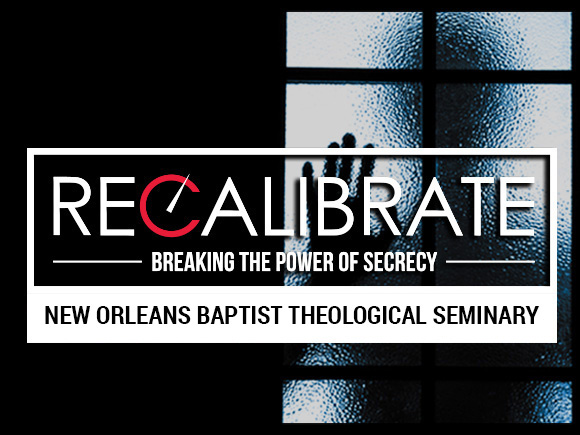By Marilyn Stewart, NOBTS Communications
NEW ORLEANS — The suicide death of a beloved colleague after a sexual addiction came to light drove the New Orleans Baptist Theological Seminary community to their knees in prayer last August. They rose determined to help others caught in pornography and sexual addiction.
“Recalibrate,” a campus-wide conference with Greg Miller of Faithful & True, a ministry to those impacted by sexual addictions, came together as a response to the death of John Gibson, longtime professor at NOBTS’ Leavell College on the opening day of classes on Aug. 24, 2015.
Thomas Strong, Leavell College dean, encouraged the seminary community to attend the April 28 conference in an NOBTS weekly publication.
“We have come to the realization through a most tragic event here on our campus that secret sin has a devastating impact,” Strong wrote. “We want to start a conversation on breaking the power of secret sin” — a conversation “seasoned with redemption and hope.”
Miller, speaking to a full audience in Leavell Chapel, said 50 percent of Christian men and 20 percent of Christian women self-report they are “addicted to porn.” Self-reported statistics, he added, typically skew low. By age 18, “virtually all” teens have been exposed to porn, either intentionally or unintentionally, Miller said.
Shame leads to secrecy which then fuels the addiction, Miller said. “Your first addiction is isolation,” he noted. “Secrecy is necessary for it to grow.”
Confidential counseling has been made available to the NOBTS community through the Leeke Magee Christian Counseling Center on campus with credentialed faculty members as well as master’s and doctoral students under the direction of state-licensed supervisors.
Kathy Steele, NOBTS professor of psychology and counseling and director of the seminary’s clinical training program, told the audience, “We’re all wounded and this is an area we’ve not done very well in. We’re determined to change that. This [conference] is a first step.”
Pastors and “strong Christians” can fall prey to secret addictions and extramarital affairs if anger and past experiences are left unresolved, Steele said. To promote emotional health, faculty members this year studied together the book “The Emotionally Healthy Leader” by Peter Scazzero.
“The day has to be over where a pastor’s wife says that she sees one man in the pulpit and another at home,” Steele said. “If you’re not who you say you are, you’re not emotionally healthy. That has to change. No wonder the church is powerless.”
‘Drinking salty water’
Miller told conference attendees, “Lust is the thirsty person drinking salt water,” with pornography only intensifying the thirst.
Sexual addiction is not about sex, but rather the way sex is used to meet deeply felt needs in harmful ways, Miller said.
“What are you escaping from? What are you escaping to?” are the questions he challenges addicts to answer.
Pornography changes brain chemistry in the same way that drug use changes an addict’s brain, Miller said, drawing from the work of Patrick Carnes, internationally recognized sex addiction expert. Pornography use leads to tolerance, then to escalation of behaviors and “acting out,” Miller said.
Miller told of being a recovering sexual addict who lost his church staff position and community standing and nearly lost his marriage as a result of sexual addiction that took root in personal feelings of inadequacy after being exposed to pornography at age 10.
Feelings of unworthiness, a self-dependence for nurture, and believing their greatest need is sex or that sex best meets needs are core beliefs of sex addicts, Miller said.
“Addiction is trying to meet a legitimate need in an illegitimate way,” Miller said. “We have to dismantle what’s driving the addiction.”
Finding hope
Owning one’s story is an important step toward recovery, Miller said, noting that people trapped in sexual addictions often are “disconnected” from the reality of the hurt their addiction has caused.
“Truth can be painful, but even painful truth can set you free,” Miller said. “Truth creates space for grace.”
Miller told of the tearful reunion with his in-laws after his sexual addiction became public and how their expression of love and grace transformed his concept of God. “Maybe the God they love can love me,” Miller realized.
Sexual addictions arise from a combination of events and experiences unique to each individual, rather than originating from a single, common experience, Miller said. But helping addicts see that they are “100 percent” responsible for their behavior is empowering, Miller added, because they then realize they have a hope for change.
Dependence on God is the only way to recovery, Miller emphasized. “God is bigger than this,” he said. “There is life beyond.”
Resources for help
In a culture where pornography is as close as the cellphone, Steele’s counsel to parents and churches included:
- Pornography and sexual addictions are rampant. Even unintentional exposure can be a hook. Parents and churches must stay alert.
- Secrecy must end. Pornography and sexual addictions need to addressed as any other sin is addressed: how to avoid; how to look away; how to find help with an addiction.
Recommended resources at the conference include the “Conquer Series” from the organization Pure Desires is a video-driven resource for which training is not required. Greg Miller recommended “Healing the Wounds of Sexual Addiction” by Mark Laaser, founder of Faithful & True based in Eden Prairie, Minn., and “Shattered Vows” by Deb Laaser, also of Faithful & True, a book for wives of men with sexual addictions.




